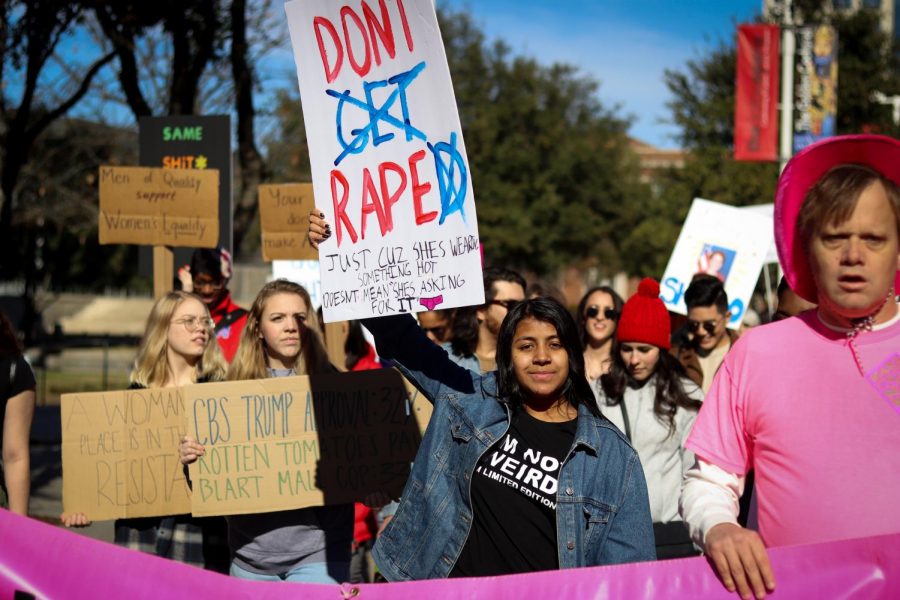Opinion: Writers, filmmakers must exercise caution with portrayals of sexual assault
Coppell High School senior Roma Mazumdar holds a sign protesting the placing of blame on rape victims at the 2020 Dallas Women’s March on Jan. 19. Although the portrayal of sexual assault in media has improved through the past decade, The Sidekick executive news and enterprise editor Pramika Kadari thinks writers and filmmakers should take precautions when including the issue in their stories.
February 6, 2020
**Disclaimer: the following article includes discussions about sexual assault, which may be sensitive to some readers.
The following story is part of a Sidekick package about feminism.
“I’m always in that house, I’m always in that room; I can’t get out,” Alyssa from “The End of The F***ing World” said, speaking of her experience with attempted rape. “I did some things I shouldn’t have done, but I didn’t deserve that.”
The series, especially in its second season, includes an incredibly respectable portrayal of sexual assault and its aftermath, which is one of the many reasons it has remained my favorite show for nearly two years.
Although the assault affects Alyssa, it doesn’t completely change who she is. Its impact on her persona is subtle, weaving its way into her thoughts and expressions without dominating her. At first, she also tries to convince herself that she’s OK, that it’s not a big deal, that she’s strong enough to not be affected; but eventually, she accepts that she is not OK, and that’s fine, and she will heal in time. She realizes that letting herself feel the pain does not make her any less strong.
“I had to do something, so I did that,” she thinks to herself while reflecting on her impulsive decision to marry someone she didn’t truly love. It is a subtle but impactful way to illustrate her desire for security after the incident.
Overall, throughout the five or so years, film and television have come a long way with their depictions of sexual assault and rape; many stories are currently handling the issue much more appropriately. I only started “Gossip Girl”, the classic television drama that premiered in 2007, last year, and I was absolutely horrified by how it depicted the topic. Within the first two episodes, one of the main characters, Chuck Bass, already attempts to assault two different girls; yet soon after, he’s conveyed as a charming and swoon-worthy love interest. One of the girls even remains close friends with him.
Needless to say, I did not finish the show.
Fans across the world still view Bass as an “ideal man” because of “Gossip Girl’s” glorification, even though he was basically a rapist. I can hardly wrap my mind around that.
Although I’m glad that sort of portrayal would never fly in today’s society without backlash, the topic is definitely still a hard one to convey. Stories should have a specific reason for including it, rather than doing so for shock value or hopping on a bandwagon.
“On one hand, it’s important to understand that this is something that happens in our world, in our society,” Coppell High School theater director Karen Ruth said. “It’s an issue. But on the other hand, portraying it in a way that’s too realistic can be extraordinarily triggering for some people. And that can take them down a really deep spiraling rabbit hole that is not mentally healthy for them. There comes a point where it’s too graphic and too intense.”
13 Reasons Why definitely falls into this category for me, particularly season two. Even with the trigger warning, one particular scene felt unnecessarily horrific. How to Get Away With Murder also has a couple of episodes where the verbal description of the assault felt overly graphic, if not the visual itself. Although I understand the argument that this makes the portrayal more honest and emphasizes the tragedy’s horror, there is a fine line between authentic and damaging.
Films and shows should focus on the victim’s reaction and personal journey more than the incident itself. Even if the actual assault is not shown at all, if the aftermath is authentically conveyed, the portrayal will still be incredibly powerful.
“Victims experience this in really different ways, and there’s no one way to process a sexual assault. If you watch any sort of true crime shows, you will see that,” Ruth said. “From depression to suicide to deviant behaviors to cutting themselves – telling everybody, telling nobody. It’s a sticky topic.”
Filmmakers must keep real-life, human victims at the forefront of their minds when deciding how to portray sexual assault – rather than trying to make a few extra dollars – because that’s who their portrayal will affect the most. Doing so may be difficult because of the entertainment industry’s pressures, but it is crucial.
“Sexual assault happens every day, everywhere, in every walk of life,” Ruth said. “I’m sure there are teachers and students who have experienced this, both men and women. And we shouldn’t be ashamed of that. We should be able to speak our truth, and be believed, and be understood. And making that known is really important.”
Follow Pramika (@pramika_kadari) and @CHSCampusNews on Twitter











